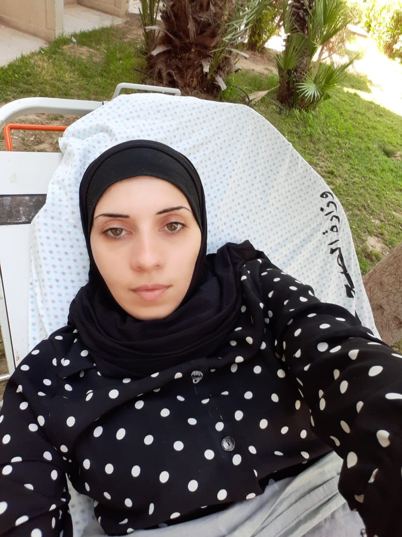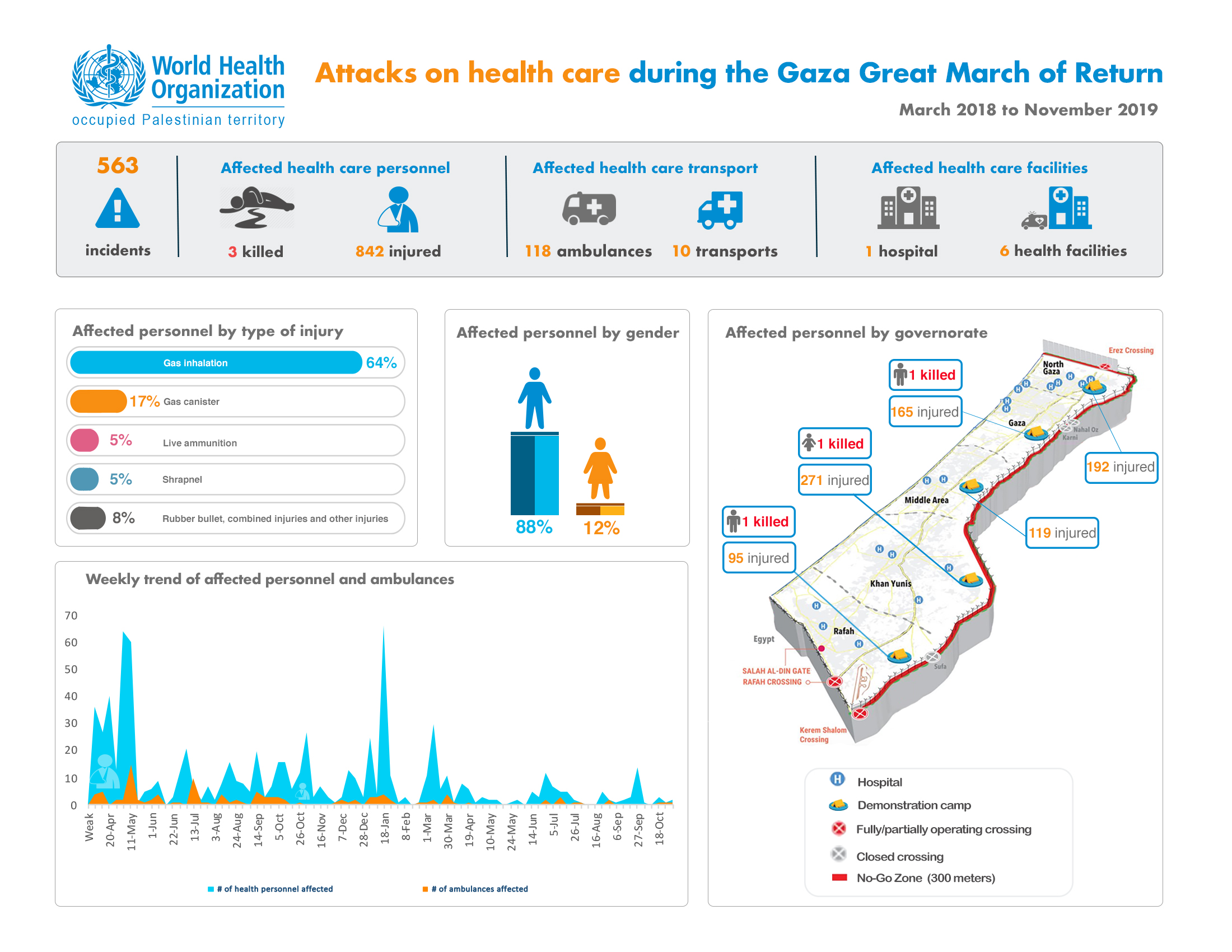 Sabreen is a 28-year-old first responder and team leader of the Nabed Al-Hayat team, working east of Rafah in the south of the Gaza Strip. Sabreen established the independent team on 6 April 2018, soon after the beginning of Gaza’s Great March of Return. Her team of 13 at the start of demonstrations included Abdullah al-Qutati, who was shot and killed on 10 August while working to provide help to those injured. Today, the team comprises 12 first responders, though different team members have had to take leaves of absence from volunteering due to injuries sustained while working to deliver healthcare. The team works closely with the Ministry of Health field medical point.
Sabreen is a 28-year-old first responder and team leader of the Nabed Al-Hayat team, working east of Rafah in the south of the Gaza Strip. Sabreen established the independent team on 6 April 2018, soon after the beginning of Gaza’s Great March of Return. Her team of 13 at the start of demonstrations included Abdullah al-Qutati, who was shot and killed on 10 August while working to provide help to those injured. Today, the team comprises 12 first responders, though different team members have had to take leaves of absence from volunteering due to injuries sustained while working to deliver healthcare. The team works closely with the Ministry of Health field medical point.
On 27 September 2019, Sabreen was treating a child who had suffered gas inhalation close to the Gaza fence. While receiving care, the child was shot with live ammunition in his back, which penetrated into his abdomen. Sabreen remembers, “At first, I collapsed with grief and started crying. Then I straight away resumed providing first aid to him [the child] until he was transferred to the medical point. We were about 100 meters from the fence… He was under my care and I couldn›t believe they would shoot a child while a paramedic was treating him. After that, a journalist standing near me had a call from the Israeli side to convey a message to me that I should leave the place and that they would shoot warning bullets to our side. While leaving, they shot about ten bullets around me.” The child, 13 years old, was transferred to the European Gaza Hospital and admitted to the intensive care unit after surgery.
Approximately 20 minutes after the child was shot, at around 6:10pm, Sabreen saw four injured persons close to the fence in need of assistance. She went forward to help and had begun to treat one of the persons when she was shot with live ammunition. The bullet went through her right forearm, severing a nerve in her hand, and into her abdomen. She had heavy bleeding from her liver and was rushed to hospital. At hospital, Sabreen was taken straight to the operating theatre to stop the bleeding. After the surgery, the doctors told her family that the bullet had lodged next to her spine and that intervening to remove it would risk additional health problems. Sabreen stayed at the hospital for four days under observation before she was discharged.
Since her injury, Sabreen has become dependent on her husband and mother to move around. She can only stand with difficulty and needs to walk slowly, requiring help for most of her daily tasks. She suffers numbness in both her legs and has also lost some movements and feeling in her right hand.
Sabreen says, “It’s not my first injury. I was shot in my head with live ammunition a few months ago which affected my sight… I feel I am targeted as a paramedic and in Gaza we have never been truly protected. In spite of all the risks, I choose to be a first responder at the fence. I believe it is our responsibility to treat those who need our help and our skills.”
Sabreen is married with a 7-year-old daughter who is at primary school. “After my injury, I haven’t been able to properly care for my daughter. Now my husband or my mother have to care for her. Sometimes my daughter has had to miss school when her father is at work. Really, it is so hard for me as a mother to be unable to care for my daughter as I want to. I never felt as disabled as when I was unable to help her.”
Sabreen sustained the 44th and 45th live ammunition injuries among health workers in the Gaza Strip since the start of the Great March of Return. From 30 March 2018 to 30 September 2019, three health workers have been killed and 832 injured in 550 recorded incidents against health staff and facilities in the Gaza Strip.

 Sabreen is a 28-year-old first responder and team leader of the Nabed Al-Hayat team, working east of Rafah in the south of the Gaza Strip. Sabreen established the independent team on 6 April 2018, soon after the beginning of Gaza’s Great March of Return. Her team of 13 at the start of demonstrations included Abdullah al-Qutati, who was shot and killed on 10 August while working to provide help to those injured. Today, the team comprises 12 first responders, though different team members have had to take leaves of absence from volunteering due to injuries sustained while working to deliver healthcare. The team works closely with the Ministry of Health field medical point.
Sabreen is a 28-year-old first responder and team leader of the Nabed Al-Hayat team, working east of Rafah in the south of the Gaza Strip. Sabreen established the independent team on 6 April 2018, soon after the beginning of Gaza’s Great March of Return. Her team of 13 at the start of demonstrations included Abdullah al-Qutati, who was shot and killed on 10 August while working to provide help to those injured. Today, the team comprises 12 first responders, though different team members have had to take leaves of absence from volunteering due to injuries sustained while working to deliver healthcare. The team works closely with the Ministry of Health field medical point.
On 27 September 2019, Sabreen was treating a child who had suffered gas inhalation close to the Gaza fence. While receiving care, the child was shot with live ammunition in his back, which penetrated into his abdomen. Sabreen remembers, “At first, I collapsed with grief and started crying. Then I straight away resumed providing first aid to him [the child] until he was transferred to the medical point. We were about 100 meters from the fence… He was under my care and I couldn›t believe they would shoot a child while a paramedic was treating him. After that, a journalist standing near me had a call from the Israeli side to convey a message to me that I should leave the place and that they would shoot warning bullets to our side. While leaving, they shot about ten bullets around me.” The child, 13 years old, was transferred to the European Gaza Hospital and admitted to the intensive care unit after surgery.
Approximately 20 minutes after the child was shot, at around 6:10pm, Sabreen saw four injured persons close to the fence in need of assistance. She went forward to help and had begun to treat one of the persons when she was shot with live ammunition. The bullet went through her right forearm, severing a nerve in her hand, and into her abdomen. She had heavy bleeding from her liver and was rushed to hospital. At hospital, Sabreen was taken straight to the operating theatre to stop the bleeding. After the surgery, the doctors told her family that the bullet had lodged next to her spine and that intervening to remove it would risk additional health problems. Sabreen stayed at the hospital for four days under observation before she was discharged.
Since her injury, Sabreen has become dependent on her husband and mother to move around. She can only stand with difficulty and needs to walk slowly, requiring help for most of her daily tasks. She suffers numbness in both her legs and has also lost some movements and feeling in her right hand.
Sabreen says, “It’s not my first injury. I was shot in my head with live ammunition a few months ago which affected my sight… I feel I am targeted as a paramedic and in Gaza we have never been truly protected. In spite of all the risks, I choose to be a first responder at the fence. I believe it is our responsibility to treat those who need our help and our skills.”
Sabreen is married with a 7-year-old daughter who is at primary school. “After my injury, I haven’t been able to properly care for my daughter. Now my husband or my mother have to care for her. Sometimes my daughter has had to miss school when her father is at work. Really, it is so hard for me as a mother to be unable to care for my daughter as I want to. I never felt as disabled as when I was unable to help her.”
Sabreen sustained the 44th and 45th live ammunition injuries among health workers in the Gaza Strip since the start of the Great March of Return. From 30 March 2018 to 30 September 2019, three health workers have been killed and 832 injured in 550 recorded incidents against health staff and facilities in the Gaza Strip.

 Sabreen is a 28-year-old first responder and team leader of the Nabed Al-Hayat team, working east of Rafah in the south of the Gaza Strip. Sabreen established the independent team on 6 April 2018, soon after the beginning of Gaza’s Great March of Return. Her team of 13 at the start of demonstrations included Abdullah al-Qutati, who was shot and killed on 10 August while working to provide help to those injured. Today, the team comprises 12 first responders, though different team members have had to take leaves of absence from volunteering due to injuries sustained while working to deliver healthcare. The team works closely with the Ministry of Health field medical point.
Sabreen is a 28-year-old first responder and team leader of the Nabed Al-Hayat team, working east of Rafah in the south of the Gaza Strip. Sabreen established the independent team on 6 April 2018, soon after the beginning of Gaza’s Great March of Return. Her team of 13 at the start of demonstrations included Abdullah al-Qutati, who was shot and killed on 10 August while working to provide help to those injured. Today, the team comprises 12 first responders, though different team members have had to take leaves of absence from volunteering due to injuries sustained while working to deliver healthcare. The team works closely with the Ministry of Health field medical point.









